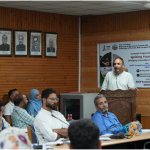Srinagar, Oct 18: The High Court of Jammu & Kashmir and Ladakh Tuesday declined to quash eviction notice against a broker in a fake arms license case being investigated under the Prevention of Money Laundering Act, 2002.
The court dismissed a plea of Syed Akeel Shah, who had challenged the eviction notice issued by Directorate of Enforcement, Sub Zonal Office, Jammu on September, 23, 2022 under Section 8(4) of the Prevention of Money Laundering Act (PMLA), 2002.
The petitioner had assailed the notice on the ground that order of attachment of the subject property confirmed by the Adjudicating Authority under Section 8(3) of the PMLA of 2002 is appealable before the Appellate Tribunal within a period of 45 days from the date on which a copy of the order of attachment is received by the aggrieved person.
“This is so provided under Section 26 of the Act of 2002,” it stated.
It was submitted by the petitioner through his counsel that the eviction notice provides only ten days time to the petitioner to vacate the subject property, and in case the eviction notice is given effect to before the petitioner is in a position to avail the remedy of appeal, the appeal under Section 26 of the Act of 2002, even if preferred within limitation, would be rendered otiose.
Perusing material on record, Justice Sanjeev Kumar noted that it didn’t find any absurdity or incongruity between Section 8 and Section 26 of the PMLA of 2002.
The court recorded that Section 8(4) of the Act of 2002 clearly provides that the authorized officer can forthwith take over possession of the attached property once the order of provisional attachment is confirmed by the Adjudicating Authority.
The court underscored that needless to say that in case Appellate Tribunal stays the order of confirmation of provisional attachment made by the Adjudicating Authority under Section 8(3) of the Act of 2002, the order or notice of eviction, if any, issued by the authorized officer under Rule 5(2) shall become ineffective.
“Let us not forget that a decree of civil court becomes effective and executable immediately and forthwith though the code of civil procedure provides ninety days to file an appeal against such decree. This is true of many other legislations,” it said.
The court observed that one may not come across any legislation where the effect and operation of decree, judgment or order is deferred till the expiry of the period of limitation prescribed for filing appeal or revision against such decree, order or judgment, as the case may be.
“One would rarely find a provision of automatic stay of decree, order or judgment appealable or revisable before higher forum or authority till the aggrieved person avails the remedy before such forum,” the court said.
The bench noted that in some circumstances or in a given case, ten days’ time available to the aggrieved person to approach the Appellate Tribunal by way of an appeal may seem to be a bit short of reasonable time, “yet this Court cannot in the disguise of interpretative process substitute “ten days” time given under Rules 5(2) of the Rules of 2013 and the expression “forthwith” used in Section 8(4) of the Act of 2002 by “forty five (45) days” or (fifty five (55) days.”
“Notwithstanding the fact that in some cases ten days time prescribed for taking possession of the attached property may result into harsh results but this Court cannot help, more particularly, when the Supreme Court has already upheld the vires of Section 8(4) of the Act of 2002 and has not found fault with any of the provisions of the Act of 2002 and the Rules framed thereunder,” Justice Kumar said.
Dismissing the plea, the court said that it is not required to resort to the principles of statutory interpretation to construe and understand the otherwise plain, clear and unambiguous provisions of Section 8 of the Act of 2002 and the Rule 5(2) of the Rules of 2013 whatever be the difficulty and whatever be the consequences.
“The provisions of Section 8(4) of the Act of 2013 read with Rule 5(2) of the Rules of 2013 are required to be given effect to so long as these provisions exist on the Statute,” the bench said.
Earlier this year, the Enforcement Directorate (ED) Jammu had attached 16 properties of various arms dealers and senior bureaucrats of J&K worth ₹4.69 crores in the fake arms license case being investigated under the Prevention of Money Laundering Act, 2002.
Fake arms license case: HC declines to quash eviction notice against broker

Leave a Comment
Leave a Comment







